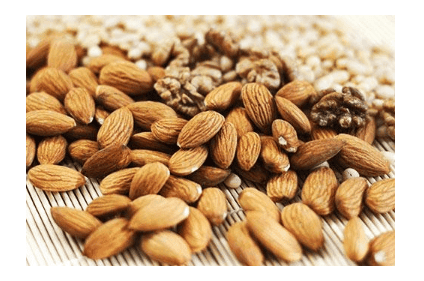This is an automatically translated article.
Introducing nuts to babies for the first time is not easy, some parents wait until their child goes to kindergarten or then introduce them to nuts. However, according to a recent recommendation from the American Academy of Allergy, Asthma, and Immunology, it is possible to introduce nuts into the infant's weaning diet as early as 6 months.
Nuts are rich in beneficial fatty acids such as: vitamin E, protein are perfect food for babies, besides, nuts are also very suitable for those who need a lot of good nutrition for growth. , develope.
1. Maybe you don't know
Life-threatening peanut allergies in children have skyrocketed over the past decade, with little hope of a cure. But a groundbreaking new study may offer a way to stem that rise, alongside studies that may offer hope to those already suffering from allergies. For years, parents have been advised to avoid feeding their children peanut-containing foods for fear of an allergic reaction.
However, in recent years, some studies have shown that the opposite is true: Giving peanut-based snacks before the child is 1 year old can prevent a pea allergy. peanut occurs. The study was published in the New England Journal of Medicine and it was presented at the annual meeting of the American Academy of Allergy, Asthma, and Immunology in Houston. The results showed that, in children at high risk of peanut allergy, eating peanut-based snacks at 11 months of age and continuing to eat these foods at least 3 times a week until 5-year-olds are 80% less likely to develop an allergic reaction than children who are not given peanuts early. People at high risk already have an allergy to eggs, they have eczema, or both.
Overall, about 3% of children who eat peanut butter or peanut-based snacks before the age of 1 have an allergy, compared with about 17% of children who don't eat them. “I think this study is really a groundbreaking and amazing finding,” said Dr. Katie Allen. She is director of the Center for Food and Allergy Research at the Murdoch Children's Research Institute in Melbourne, Australia. Allen was not involved in the study. Experts say the study could change minds about how children develop food allergies and it will change the guidelines doctors give parents. Meanwhile, for children and adults already allergic to peanuts, another study presented at the same meeting offered hope for a new treatment. A new skin patch called Vitaskin allows people with peanut allergies to eat small amounts of peanuts after they've worn it for about a year.

Việc đưa các loại hạt cho bé ăn dặm lần đầu tiên thật không dễ dàng
2. Changes in the principles of eating nutritious nuts for babies
Allergies to peanuts in particular and to foods made from other nuts in general are on the rise. In the US, more than 2% of people are allergic to peanuts, a number that has increased by about 400% since 1997. And allergic reactions to peanuts and other tree nuts can be especially severe. One of the most dangerous problems with a nut allergy is anaphylaxis.
In 2000, the American Academy of Pediatrics recommended that parents avoid giving nuts to infants until the age of 3. In 2008, the guidelines were updated to state that there is insufficient evidence that avoiding certain foods, such as nuts, during the early years can prevent an allergic reaction. But the academy also doesn't exactly endorse the idea of early introduction of these foods. And children's books, like the popular What to Expect series, still advise parents to keep peanuts, eggs and milk off their baby's menu for at least the first year.
Some experts say that advice is wrong. “We may have contributed to the peanut allergy because of the guidelines established,” said Dr. Rebecca Gruchala, director of the Department of Allergy and Immunology at the University of Texas Southwestern Medical Center, in Dallas. written in 2000”. Gruchala wrote an editorial about the new study but was not involved in the study. "Not only do we not need to delay, we really need to introduce nut-based foods early to children at risk of peanut allergy," she said.
3. Snacks made from organic nuts for weaning babies
Variety is the key to good nutrition, and the same is true for children. Nuts are especially nutritious foods for children because they are rich in essential nutrients that children need to help them grow and develop. Nuts and seeds can make a significant contribution to helping to meet the nutrient requirements of a growing child, including:
Protein: An essential nutrient needed for the growth and development of children. young. Iron: Necessary to bind and transport oxygen in the blood as well as strengthen the immune system. Zinc: Important for immunity and helps with carbohydrate and protein metabolism. Calcium: Essential for bones and teeth, as well as supporting blood clotting, muscle contraction, and nerve function. Fiber: Important for a healthy digestive system. Vitamins and Minerals: Act as antioxidants, and are important for energy production. Adding nuts to baby's weaning meal is also a way to increase nutrients during this period. Plus, nuts are a convenient, healthy snack because they're rich in healthy fats, fiber, and protein, and packed with essential vitamins, minerals, and antioxidants. Nuts should be given to infants from about 6 months of age in the form of butter or paste to avoid the risk of choking. Here are some nuts parents can consider including in their baby's weaning diet:

Các loại hạt là thực phẩm đặc biệt bổ dưỡng cho trẻ em vì chúng rất giàu các chất dinh dưỡng thiết yếu
3.1. Almonds Children with lactose intolerance or difficulty can get a great supplement from eating calcium-rich almonds. Almonds are also high in vitamin E, a nutrient that helps improve the look and condition of your baby's skin. It also helps the heart due to heart-protective components called flavonoids. Almonds also help in brain development of children, so it is very helpful to give them a little butter or almond meal every day. The compounds contained in almonds normalize the production of a hormone in the brain called dopamine. Dopamine not only helps in brain development, but it can also make the brain work smoothly and improve mood.
3.2 Walnuts Walnuts are rich in Omega-3 fatty acids, so they work to help children maintain normal blood pressure. They also lower children's cholesterol levels and inflammatory syndromes and help them maintain a healthy heart. High levels of magnesium help children prevent type 2 diabetes. Walnuts are also one of the foods that are very rich in Vitamins B1 and B6, which help develop brain tissue and nerve health in children. It also contains a large amount of saturated and monounsaturated fats that help lower the bad cholesterol (LDL cholesterol) of children. In addition, walnuts also help improve memory, give shiny hair.
3.3. Brazil nuts Brazil nuts are rich in selenium which has many benefits for adults. However, for children, it helps to increase immunity and heal wounds faster. Selenium is also needed for thyroid hormone production. They also help fight the risk of liver cancer and reduce the risk of skin cancer. They also lower cholesterol levels besides preventing depression and anxiety.
Brazil nuts are anti-inflammatory and full of antioxidants, so they can make your baby's skin glow. They also help children develop red blood cells, mainly because they are high in Vitamin E. Vitamin E also helps with heart development. Older children entering puberty can also benefit from brazil nuts as they can clear acne and other skin blemishes.
3.4. Cashews Although delicious, cashews contain very high fat content. In fact, they are rich in heart-healthy, monounsaturated fatty acids. These fats also lower bad cholesterol levels in the blood. Cashews are also high in selenium, which has antioxidant properties that help neutralize free radicals in the body; at the same time helps to absorb essential minerals in the blood
Zinc content in cashews also helps to build a strong immune system. Cashews are also rich in protein, which helps children build bones, muscles, blood and organs. They also contain magnesium which contributes to your baby's bone growth.
3.5. Chestnuts Chestnuts are popular not only for their taste but also for the various health benefits they provide. This is a food that nourishes the body, maintains strong teeth and is capable of solving children's respiratory problems. This nut is also rich in carbohydrates, starches and fiber as well as being rich in Vitamin C. They contain B vitamins, including B6, which are good for the development of bones, muscles and nerves.
3.6. Hazelnuts Hazelnuts are rich in B vitamins, which help support many different functions of the body, such as regulating the nervous system, digestion, and the production of healthy red blood cells. Hazelnuts also aid in hair and skin growth.
3.7. Macadamias (Macadamia nuts) Although these nuts are high in fat, they are rich in monounsaturated fats and therefore are good for the heart. Macadamia nuts are also rich in fiber and minerals like magnesium, potassium and calcium. Like hazelnuts, macadamia nuts have a distinctive sweet taste and are packed with nutrients. They speed up metabolism because they contain an acid known as palmitic acid, which prevents fat storage.
3.8. Pecans Pecans are great at lowering cholesterol levels as well as being rated as a heart-friendly food. In addition, pecans are also a source of healthy energy.

Hạt điều cũng rất giàu protein, giúp trẻ xây dựng xương, cơ, máu và các cơ quan
4. Advice for young parents
Sicherer and other experts suggest that parents should not start feeding their children foods with peanuts, especially if the child is at high risk for allergies or has a parent with allergies or asthma. "I don't want the whole world to go out and start feeding a four-month-old baby peanuts without being evaluated first if they're in the highly allergic group," says Grunchalla. Before the children in the peanut-eating group began the study, she said, they had to undergo an oral challenge supervised by a doctor to make sure they could safely eat peanuts. Even children who have passed a skin allergy test can still react to foods.
It is also unclear whether children will continue to maintain a peanut tolerance if they do not eat them regularly. For that reason, Lack still followed the children in the study to see if the difference persisted over time. “That is the important question. 'Is the immune system really modified for life?' And we don't know the answer,” said Gruchalla.
In the past, parents were often advised not to give nuts or cow's milk until the baby was 1 year old. However, recent studies show the opposite. Early exposure to nuts can make a child's immune system work better at preventing an allergic reaction that may occur when he or she eats those nuts later on. In addition, oral immunotherapy is also being applied and gradually becoming popular. However, this therapy requires close supervision from doctors because it can cause scary reactions.
In addition, nutrition plays an important role in helping children develop comprehensively. Children who do not eat properly are at risk of micro-mineral deficiencies, causing anorexia, growth retardation, malabsorption, etc. If they notice the above signs, parents should supplement their children with supportive products. The supplement contains lysine, essential micro-minerals and vitamins such as zinc, chromium, selenium, and B vitamins to help fully meet the nutritional needs of children. At the same time, these essential vitamins also support digestion, enhance nutrient absorption, help improve anorexia, and help children eat well.
Parents can learn more:
Signs of zinc deficiency in children
Micronutrient deficiency and failure to gain weight in children
Please regularly visit Vinmec.com website and update useful information to take care of your child. Take care of the baby and the whole family.
Reference sources: webmd.com, parents.com













